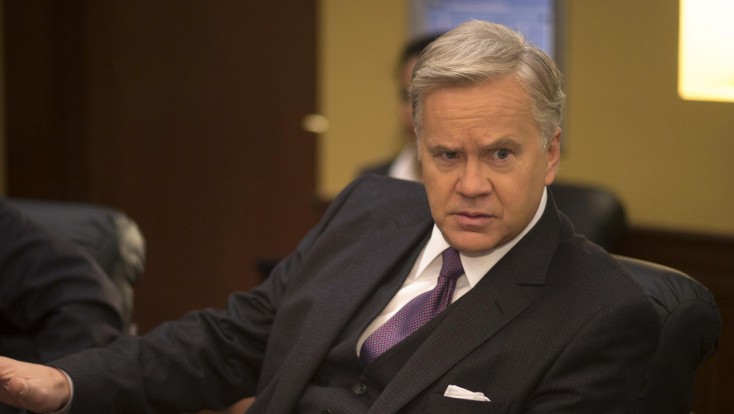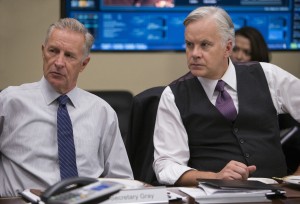By ANGELA DAWSON
Front Row Features
HOLLYWOOD—Tim Robbins is no stranger to American politics onscreen or off. An outspoken liberal Democrat in real life, he played a conservative Republican folk singer in the mockumentary “Bob Roberts.” But, for the most part, the social issue films he has appeared in have reflected his left-leaning views: “The Shawshank Redemption,” “Dead Man Walking,” “Catch a Fire” and “The Lucky Ones.” He earned an Oscar for his supporting performance in “Mystic River,” and an Oscar nomination for directing “Dead Man Walking.”
In recent years, the Southern California native has turned his attention to the small screen, directing two episodes of the post-Katrina drama “Treme,” and starring in “Cinema Verite,” a fictionalized account of one of TV’s first “reality” shows involving an American family called the Louds, for HBO.
He returns to HBO as the star of the geopolitical satire “The Brink,” in which he plays Walter Larson, a U.S. Secretary of State, who, for all his personal foibles, may be the only sane person in the President’s inner circle to keep the country from heading into nuclear war. The show’s 10-episode season begins Sunday, June 21 (10:30-11 p.m. ET/PT). “The Brink,” created by Robert and Kim Benabib, also stars Jack Black (“School of Rock,” “King Kong”), Alex Talbot, Pablo Schreiber and Aasif Mandvi.
During a recent interview, the 56-year-old actor spoke about starring in his first TV series and why potential nuclear annihilation is appropriate fodder for comedy. He not only stars in the series but he also got a chance to direct an episode as well.
Q: How did you like doing your first TV series? What appealed to you about “The Brink?”
Robbins: I loved it. It’s such a great crew. The script was so well written and the content was courageous. In the second episode you have Jack Black being waterboarded and the head of the intelligence service in Pakistan saying, “Don’t worry. The CIA said it’s just enhanced interrogation. It’ll be fine.” Just to be able to illuminate that truth onscreen was a real gift. Having worked with HBO before, I knew they were a lovely group of people to work for.
Q: What brought you onto this project? You’ve done political satire before.
Robbins: There’s not a lot of political satire out there. When I read this script, I’d gone through three years of turning down television series for a lot of money. But I felt I didn’t respond to the material the way that it would make me passionate about it and want to commit to for a long period of time. It was really after saying no to four of these offers that this one came in and read it. I immediately knew that this was something I could engage in and it would be stimulating for me on a long-term basis. The topics they were dealing with and the way they were dealing with them, I could see they were approaching them with a risk-taking, courageous way. I just loved the potential that held. When I met with them I realized they were going to go for it. They weren’t going to temper it down. They talked about “Dr. Strangelove.” If you want to go on that journey I’ll go on that journey with you. I feel it’s worth the time. As you get older, you look at it as an investment of time.
Q: Was the idea of playing an American antihero appealing to you?
Robbins: Yeah, I don’t know if he’s an antihero. I like that he’s complicated. He’s the voice of reason in a room that’s advocating war. He prefers diplomacy. He doesn’t want to see the world in the midst of a nuclear war, but he’s also morally complicated. He’s not a knight in shining armor; he’s got his own issues.
Q: What was the biggest stretch for you? How closely do you identify with your character?
Robbins: The biggest stretch was to be able to direct (episode two) and act at the same time. It’s when you have to let go of any preciousness because you have a schedule to make. The most challenging thing for me was to play this character as someone who is living fast and hard and so it made a lot of sense for me that he always spoke very quickly. When you have a half page of monologue that has to be done in five seconds, that’s challenging. Not only to remember it, but also to remember that pace is important, that pace is of the essence. It’s easy to remember something if you’re languorous with it, but this is like a Preston Sturges kind of thing: you have to (quickly claps his hands together). Those things are always best if they’re done in two shots, not in close ups. I was really blessed to work with Iris Bahr, who is a fantastic comedienne. We were improvising stuff off each other and it was a lot of fun.
Q: What do you like and what do you hate about your character?
Robbins: I like that he’s the voice of reason. I like that he has a concern for mankind. That he sees issues that are surrounding foreign policy are complicated and not black and white. He uses whatever means necessary to achieve his goals. What I don’t like? I like the guy. I can forgive his weaknesses.
Q: His peccadilloes?
Robbins: Yes, I can forgive his peccadilloes. I wound up liking him a lot.
Q: The first time we see you onscreen you’re naked. So that tells the audience this is going to be a different kind of TV show. Were you nervous?
Robbins: First of all, that’s the first thing I read when I read the script. I was like, “What?” What I’d been told before that is that I was going to play the Secretary of State. I thought, “Well, this could be really boring.” And then I read the first scene, and I was like, “I’m in!” (He chuckles.) That’s the best introduction of a character ever. It’s always weird to be naked on film. It’s always just a weird situation. It says to the viewer, “Yes, we will go there.” But that’s what satire is; satire has to go there. Satire has to be as adept at sexual farce as it is with socioeconomic insight. It has to have both. And it did. It was interesting because I read the script. Then I found out Jack (Black), who has been a friend for many years, was interested in doing it. I went to meet the show’s creators and within a week I had signed on. And within two months we had shot the pilot episode. Then within three weeks of that we were going to series. That doesn’t happen very often. It was on a fast track, which was nice. There wasn’t a lot of waiting around and wondering if it’s going (to go to series) or not.
Q: Do you credit HBO for that?
Robbins: Yeah, and it’s also (producer) Jerry Weintraub. He’s a force of nature and an absolute delight. But, yeah, it’s also HBO. I’ve loved working with them on the stuff I’ve done in the past five years. To be in the hands of a producing organization that not only has insight and vision as far as what they want their content to be, it also enables the creators of that vision to do their vision. They don’t mess around too much with the creators. They give a few notes on the script. We do read-throughs that they actually come to. So they’re completely invested in it but they’re smart enough to know when you want to create something unique you have to allow a certain vision to emerge. That’s the way filmmaking used to be when I was coming up in the ‘80s and ‘90s. There are still a few people who are able to see their vision realized but it’s become more and more difficult.
Q: Have you been allowed to give a lot of input into the script? Was there ever something that you thought went too far?
Robbins: No. That’s what was a joy about it. We were right on the same page. I remember going to the makeup trailer one morning to get ready to do a scene for either the fourth or fifth episode where I’m meeting the Israeli foreign minister, and they gave me a new line in the makeup trailer, and it was one of the funniest lines I’d ever read. I was like, “Oh my God, I get to do this today!” It was about neo-cons and their influence over American foreign policy. I won’t say what the line is but it was so funny and so insightful that I thought, “Oh, what great hands I’m in.” Yes, the script was great to begin with but they’re still thinking, they’re still trying to sweeten it up to make it even better.
Q: Do you think this satire demands a lot of the audience to put aside prejudices and be open because it skewers everyone?
Robbins: Yes, but it demands a lot of the creators too. They have to have a lot of courage. You can’t be a satirist and be polite. You have to go all the way and commit to it. I believe satirists shouldn’t be invited to nice parties. They should be the one that is left off the guest list because they might find out the truth and satirize it. I think a lot of humor that we think of as satire is really parody; it’s just imitation.
Q: Do you think this nails it a little more?
Robbins: I think so. It’s got courage. It’s talking about things that people aren’t talking about. It’s also satirizing a form of entertainment that’s emerged in the last seven or eight years of doom and gloom dramas set in a world full of terror. It satirizes that as well.
Q: This kind of pokes fun at Americans. Do you think American audiences can laugh at themselves in this?
Robbins: I believe it is and here’s why: I have two sons. They’re 23 and 26. They are on it. This is the generation that when they were teenagers, this war happened that was propagandized and sold. They saw it happen. They also saw that the world did not want it, and we did it anyway. So they have a view of American foreign policy and a view of the world that is more highly refined than I had at their age, because of their access to information. They’re access to the Internet exposes them to way more to information than I had at that age. I had to seek it out. I found it, but I had to actively seek it out. This younger generation is much more ready for this kind of satire than previous generations.
Q: What’s happening with your acting troupe The Actor’s Gang?
Robbins: It’s traveling all around Europe right now. We just played Leon, at a Roman amphitheater there. “Midsummer Night’s Dream,” which I directed. And we’re going to Milan and then two festivals in Spain.
Q: What causes are you working on now?
Robbins: We’re doing work in the prisons with rehabilitation. We just got California to reinstate as a line item in the state budget for arts and rehabilitation: $3 million into stuff that will eventually help all of us because it’s a safety issue. If you’ve got people in prison, they’re going to get out. Wouldn’t you want them to have more tools to deal with pressure and disappointment than when they went in? So it’s very exciting for us as an organization.






